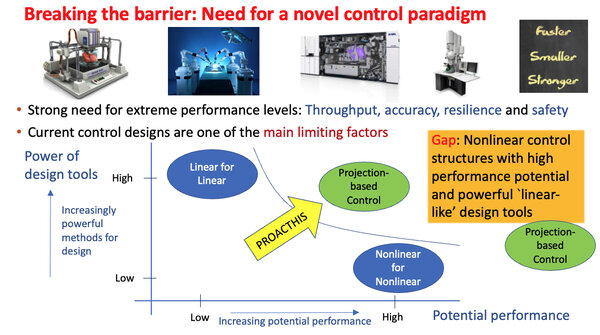Projection-based Control (PROACTHIS)
Developing the system theory to pave the way towards cutting-edge projected control technologies for high performance and safety of future engineering systems
Duration
November 2022 - October 2027Subsidy
€ 729.640Project Manager

The field of control has been a key driver for major societal innovations in health, mobility, energy and manufacturing. At present, technological trends push the performance and safety requirements for future applications to extreme levels that are far beyond current control solutions. This calls for flexible control structures accompanied by systematic design and online optimization frameworks exploiting time- and frequency-domain information to realize the unparalleled performance needs of future engineering systems.
In the ERC Advanced Grant PROACTHIS, this need will be addressed by creating new control paradigms based on smart projection operators.
◊ By introducing projections in control loops, specific signals are kept in well-chosen constraint sets inducing direct performance-enhancing benefits, as, for instance, also observed in reset controllers, only now with the benefit of having continuous control signals and easier analysis. In fact, projected control systems can overcome the fundamental performance limitations known to LTI (linear time-invariant) control systems, and, if a proper design toolkit is available, can be a game-changer for high-performance motion and process control.
◊ Projection operators can also enforce safety guarantees by keeping specific signals in desired (safety) constraint sets. As such, the study of projected dynamics can provide important insights on recent popular controllers based on control barrier functions and online feedback optimization, leading to safe control solutions.
Developing projection-based control theory requires the study of a new class of discontinuous dynamical systems that have never studied before, and requires extensions of the classical projected dynamical systems (PDSs) framework. Successfully developing this new system theory will pave the way towards cutting-edge control methodologies addressing the needs of future engineering systems regarding resilience, performance and safety.
Researchers involved in this project
Subsidy Provider
-
European Commission
